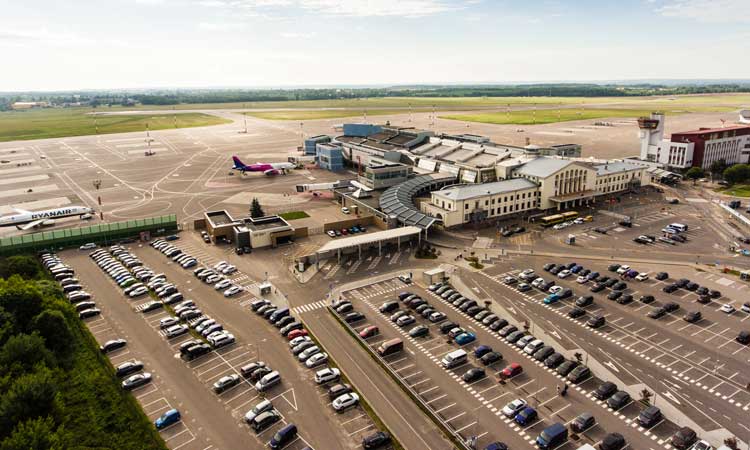The benefits of a new baggage management system
- Like
- Digg
- Del
- Tumblr
- VKontakte
- Buffer
- Love This
- Odnoklassniki
- Meneame
- Blogger
- Amazon
- Yahoo Mail
- Gmail
- AOL
- Newsvine
- HackerNews
- Evernote
- MySpace
- Mail.ru
- Viadeo
- Line
- Comments
- Yummly
- SMS
- Viber
- Telegram
- Subscribe
- Skype
- Facebook Messenger
- Kakao
- LiveJournal
- Yammer
- Edgar
- Fintel
- Mix
- Instapaper
- Copy Link
Posted: 29 July 2020 | Dainius Čiuplys - Vilnius Airport | No comments yet
New self-service baggage drop-off stations are to be implemented at Vilnius Airport, details Dainius Čiuplys, Director of Vilnius Airport, to decrease check-in times.


Vilnius Airport – managed by state‑owned Lithuanian Airports – is set to benefit from a new baggage management system, baggage screening system and self-service baggage drop‑off stations that are compliant with the newest international security standards. International Airport Review spoke to Dainius Čiuplys, Director of the airport, to find out more regarding this decision.
How did you come to the decision that a new baggage management system was needed?
In order to efficiently handle our growing number of passengers and their luggage, we have to invest in technologies that improve our throughput. Therefore, we have decided to build a new departures terminal at Vilnius Airport with the aim to reduce congestion, especially during peak hours, and improve the passenger experience.
A new baggage handling system will be required at the new departures terminal. Simply transferring our current system into the new building does not make sense economically. As well as this, the current system’s operational cycle will soon end, so investing in a new system is needed, regardless.
Our main overall strategy is to maximise automation and make Vilnius Airport operations more effective”
The new system will also allow us to improve security screening at the airport, as we must comply with the recent changes to the ECAC standard. We must also integrate the new ECAC‑compliant explosives detection systems (EDS) into our upcoming baggage handling system. Integrating the new EDS into our current system is, again, not rational.
Our main overall strategy is to maximise automation and make Vilnius Airport operations more effective as we strive to offer our passengers more self-service options.
What challenges exist when changing to a new system?
A smooth transition from the current to the new system overnight will be one of the biggest challenges. We will ensure a smooth transition with rigorous planning and personnel training. We are focused and determined to launch our new system without a glitch.
The new baggage handling system will be more complex than the current one, so utilising it to the fullest will be a challenge. We will receive continuous support from the equipment supplier, which will be responsible for calibration, after-service and warranty. Additionally, we will train our colleagues who will work with this system on a daily basis.
How will the airport benefit from a new system?
Upon completion of these works, the baggage throughput rate will nearly triple, from 900 to 2,400 units per hour. That means we are going to become more flexible and ready for all possible passenger flow changes, which are also growing year-on-year.
Will the passenger experience be affected?
There is no doubt passenger experience will be affected positively. All of the technological changes at the airport are aimed towards reducing time needed to be ready for a flight: The key for passengers to be happy using the airport.
In the airport of the future, how different will baggage handling processes be? Will there be robotics and automation involved?
We observe a tendency that baggage handling systems are being revamped across European airports in order to comply with the latest ECAC standards. Like in any industry, improving processes and delivering higher quality services while optimising costs is our goal. Technologies that automate processes, or parts of the processes, will help us reach the mentioned goals.
The increase in self service is another observed trend at airports. People who travel more frequently are well acquainted with the airport’s usual processes and services and so increasingly opt for self-service alternatives, where available. As air carriers and airports strive to become more cost effective, self‑service technologies – like online check in or check in using airport kiosks – have become widely popular. The same reasons are behind the increasing number of self baggage drop-off (SBD) stations used at airports.
Further on, we predict that baggage handling will become a fully automated process”
In the near future, luggage may well be handled using artificial intelligence (AI) solutions and RFID luggage tag scanning technology to further fasten the registration process. Further on, we predict that baggage handling will become a fully automated process. We are closely monitoring all options in the market and we can already state that we will be the pioneers of some of these innovations in our region.
Alongside the new baggage system, we are also working on a T4 terminal and new VNO departures terminal project. We are looking for a contractor to be entrusted with the construction currently, and it will be open by 2022. The new face of Vilnius Airport will include a reorganisation of transport access in front of the airport and a new departures terminal, alongside the current terminal.
Biography
Dainius Čiuplys is Director of Vilnius Airport, with a bachelor’s degree in Applied Electronics, and 12 years’ experience in WCO, project and quality management.
Issue
Related topics
Baggage handling, New technologies, Passenger experience and seamless travel, Passenger volumes, Terminal operations

















